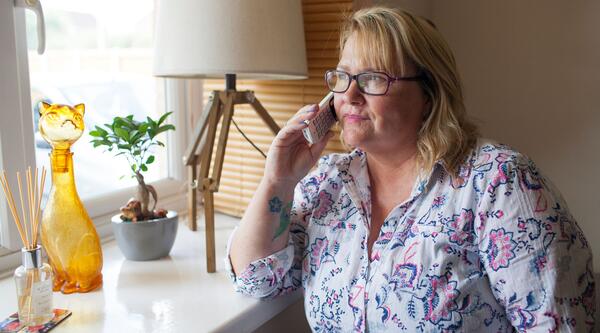Dementia and challenging sexual behaviour
A person with dementia may experience changes in how they respond to sex, be inappropriate or aggressive, mistake a person for someone else, or behave sexually in public. There are ways to manage challenging behaviour.
Sex, intimacy and dementia
- How does dementia affect sex and intimacy?
- Sexual health and dementia
- Consenting to sex and intimacy after a dementia diagnosis
- How can dementia affect a person’s sexual behaviour?
- You are here: Dementia and challenging sexual behaviour
- Maintaining your relationship after a dementia diagnosis
- Sex and intimacy in care homes
- What to do if you suspect sexual abuse
Dementia can cause a person to behave in a 'sexual' way that they and people around them may find challenging.
A person with dementia may experience changes in how they respond to sex, be inappropriate or aggressive, mistake a person for someone else, or behave sexually in public. These situations can be difficult to understand or deal with, particularly if the person with dementia is your partner.
Choose from the options below to find out more about these behaviours and what support is available
Some people with dementia will respond as they always have during sex. However, some partners say that a person with dementia can appear cold and detached. Others say that their partner forgets that they have had sex immediately afterwards, or no longer appears to recognise them as their partner.
These situations can be upsetting and confusing both for the person with dementia and their partner.
Find out more about coping with these changes on our page, 'How can dementia affect a person's sexual behaviour'.
Inappropriate behaviour around care staff
Your partner may sometimes behave in inappropriate ways towards other people. They may act in a sexual way that distresses care workers when they are providing personal care – for example, when they are helping with washing. The person with dementia might say or do things that are inappropriate. This can cause embarrassment and you might even feel you should stop employing outside help.
Inappropriate behaviour around vulnerable people and children
The person with dementia might also act in a sexual way around, or towards, children or other vulnerable people.
If this happens, you will need to take steps to protect them – for example, stopping unsupervised time between the person with dementia and their grandchildren. Even though you might feel uncomfortable or guilty about this, remember that it’s necessary.
What can you do about inappropriate behaviour?
It is important that you share any of these concerns with other family members, with the care workers themselves or other health or social care professionals. They may be able to prevent this from happening or suggest how to minimise the impact when it does – for instance by looking at distraction techniques based on your partner’s individual likes, dislikes and preferences.
You might also find it helpful to look at our page Explaining dementia to children and young people, to explain changes in the person’s behaviour where children are involved.
Why is the person with dementia mistaking a person for someone else?
Dementia can cause changes to a person’s perception of situations, people and things. As a result, the person with dementia may mistake people (even those who are very close to them) for others, which can be distressing for everyone involved.
If your partner mistakes someone else for you, and behaves sexually or affectionately towards them, it is natural that you will feel upset. Try to approach the situation in a way that maintains the dignity of the person with dementia as much as possible.
What can you do if the person with dementia is mistaking a person for someone else?
Although it might be difficult, try not to take your partner’s behaviour personally. Remember that this behaviour is likely to be caused by difficulties and changed perceptions caused by dementia.
Try not to make accusations or be offended, and instead talk to them calmly in private. This should help the person not to feel embarrassed or distressed.
In rare cases, some people with dementia may go through a phase of being sexually aggressive – for example, making repeated demands for sex from their partner or other people.
If this happens, you might find it helpful to remove yourself or others from the situation until they calm down. It can be useful to ask any care workers if they have also noticed any inappropriate behaviour.
What can you do is a person with dementia is aggressive?
If the level or threat of physical force is difficult to manage, it is important that you still feel safe. If you do not feel safe, it is best to remove yourself from the situation and seek help. There are professionals and organisations who can support you, for example the non-emergency police line on 101, the Samaritans or Refuge.
If you feel that there is an immediate risk of violence to yourself or others then you should call the police by dialling 999. You may feel uncomfortable or guilty about doing this, however it is very important that you and others are safe.
Why is a person with dementia being 'sexual' in public?
Dementia can affect a person’s inhibitions, which may mean they express private thoughts, feelings and behaviours – including those related to sex – publicly.
These thoughts, feelings and behaviours may be out of character. Sometimes a person with dementia may make sexual advances to others, or undress or touch themselves in public. They may also use language that you have never heard them use before.
Find out about coping with these changes on our page 'Losing inhibitions'.




